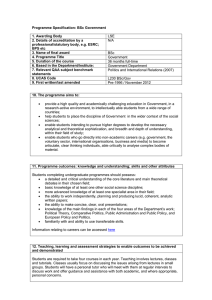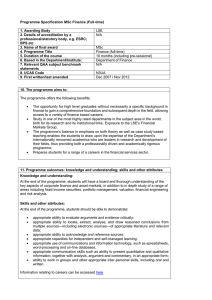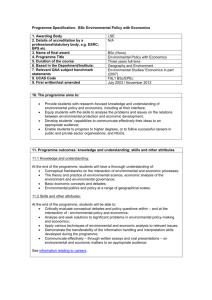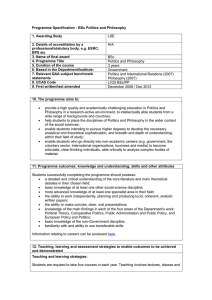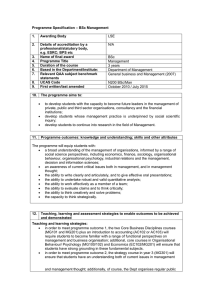Programme Specification: BSc Government and Economics 1. Awarding Body
advertisement
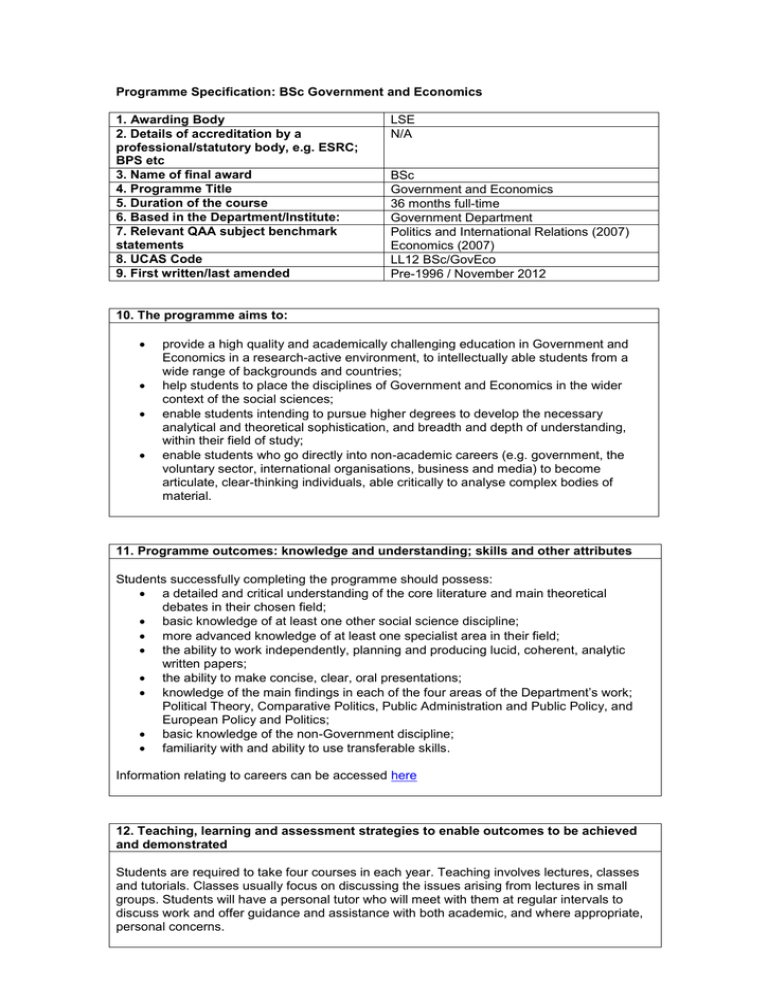
Programme Specification: BSc Government and Economics 1. Awarding Body 2. Details of accreditation by a professional/statutory body, e.g. ESRC; BPS etc 3. Name of final award 4. Programme Title 5. Duration of the course 6. Based in the Department/Institute: 7. Relevant QAA subject benchmark statements 8. UCAS Code 9. First written/last amended LSE N/A BSc Government and Economics 36 months full-time Government Department Politics and International Relations (2007) Economics (2007) LL12 BSc/GovEco Pre-1996 / November 2012 10. The programme aims to: provide a high quality and academically challenging education in Government and Economics in a research-active environment, to intellectually able students from a wide range of backgrounds and countries; help students to place the disciplines of Government and Economics in the wider context of the social sciences; enable students intending to pursue higher degrees to develop the necessary analytical and theoretical sophistication, and breadth and depth of understanding, within their field of study; enable students who go directly into non-academic careers (e.g. government, the voluntary sector, international organisations, business and media) to become articulate, clear-thinking individuals, able critically to analyse complex bodies of material. 11. Programme outcomes: knowledge and understanding; skills and other attributes Students successfully completing the programme should possess: a detailed and critical understanding of the core literature and main theoretical debates in their chosen field; basic knowledge of at least one other social science discipline; more advanced knowledge of at least one specialist area in their field; the ability to work independently, planning and producing lucid, coherent, analytic written papers; the ability to make concise, clear, oral presentations; knowledge of the main findings in each of the four areas of the Department’s work; Political Theory, Comparative Politics, Public Administration and Public Policy, and European Policy and Politics; basic knowledge of the non-Government discipline; familiarity with and ability to use transferable skills. Information relating to careers can be accessed here 12. Teaching, learning and assessment strategies to enable outcomes to be achieved and demonstrated Students are required to take four courses in each year. Teaching involves lectures, classes and tutorials. Classes usually focus on discussing the issues arising from lectures in small groups. Students will have a personal tutor who will meet with them at regular intervals to discuss work and offer guidance and assistance with both academic, and where appropriate, personal concerns. Assessment usually involves a written examination in each subject at the end of the academic year. For some courses assessment will involve an extended essay. 13. Programme structures and requirements, levels, modules and awards See BSc Government and Economics programme regulations. Additional information 14. Criteria for admission to the programme A Level or International Baccalaureate Higher level Mathematics is required. GCE A level: grades A A A including Mathematics (from 2011-12). International Baccalaureate: Diploma with 38 points including 7 6 6 at higher level (to include Mathematics). Other qualifications are considered. 15. Indicators of quality 1. Steady demand for the programme and high qualifications required for admission. 2. Consistently high rankings in various independent University league tables. 3. Consistently good examination results and very favourable remarks by external examiners. 4. Student questionnaires and feedback via student liaison committees. 5. Excellent career opportunities as demonstrated by the destinations of LSE graduates on the LSE Careers Centre website 16. Methods for evaluating and improving the quality and standard of teaching and learning Teaching Committee (undergraduate) looks at teaching and assessment issues twice a year. Minutes go to the Departmental Meeting; Staff Student Liaison Meetings for all undergraduate students. Meets twice during the Michaelmas Term, once to elect representatives then a second meeting to discuss issues with the representatives. Meets again in the Lent Term. Minutes go to the Departmental Meeting; Undergraduate Degree Reform. In 2001-2 all our degrees at the undergraduate level were revised and the School approved these changes to be implemented from October 2003; Part-Time Teachers - 2 Meetings with the Convenor to discuss teaching issues. They are monitored during the Michaelmas Term. The Lecturer responsible for the course sits in on one class per class teacher, provides feedback, sends me a report and checks new teachers' marking of non-assessed essays. We take remedial action by the start of the Lent Term if a teacher does not achieve an acceptable standard; TQARO student surveys. The Convenor analyses the scores of part-time teachers and writes letter of congratulation to those achieving high scores and asks the Lecturer responsible to monitor those who score below an acceptable level. The Convenor also looks at the scores of academic staff teaching all courses and takes action if necessary. Peer review of academic staff on a regular basis; External examiner check-up system by TLAC; Review of all new courses and programmes, and major modifications, by USSC; Full departmental TLAC review every 5 years; Improvements in teaching technique through observations, advice and further training from the Teaching and Learning Centre.
